Shoppers in China have been tightening their purse strings, raising questions over how faltering consumer confidence may affect Saturday’s annual Singles’ Day online retail extravaganza.
Singles Day, also known as “Double 11,” was popularized by e-commerce giant Alibaba. In the days leading up to the event, sellers on Alibaba and elsewhere often slash prices and offer enticing deals.
Given prevailing jitters about jobs and a weak property market, it’s unclear how this year’s festival will fare.
A Bain & Company survey of 3,000 Chinese shoppers found more than three-quarters of those who responded plan to spend less this year, or keep spending level, given uncertainties over how the economy is faring.
That includes people like Shi Gengchen, whose billiard hall business in Beijing’s trendy Chaoyang district has slowed.
“The current economic situation is lousy and it has affected my business, there are fewer customers than before,” said Shi, adding that his sales are just 40% of what they were before the pandemic.
“I don’t spend a lot,” he said. “Of course, everyone has a desire to spend, but you have to have the money to spend.”
Chinese consumers were much more eager to splurge before COVID-19 hit in 2020. Shoppers spent $38 billion in 24 hours on Alibaba’s e-commerce platforms during Singles’ Day in 2019.
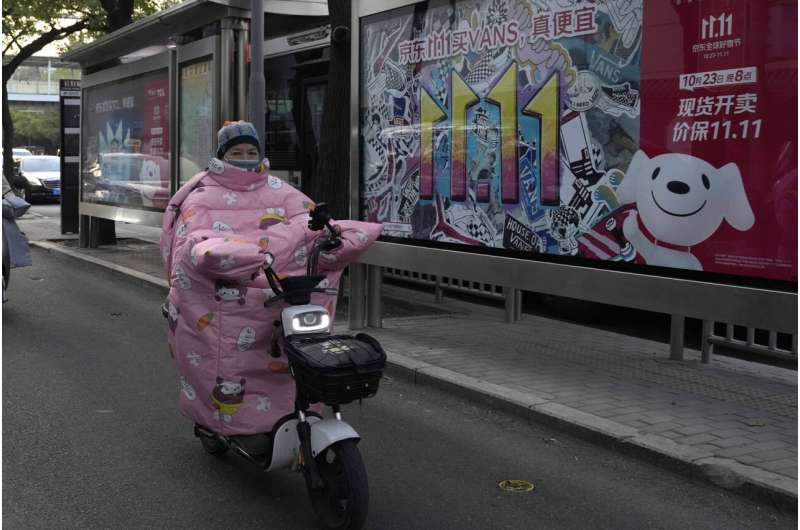
But Chinese have become much more cautious over splashing out on extras, analysts say.
“The hype and excitement around Singles’ Day is sort of over,” said Shaun Rein, founder and managing director of Shanghai-based China Market Research Group. “Consumers have over the last nine months been getting discounts on a steady day-to-day basis so they aren’t expecting major discounts on Singles’ Day except for consumables,” he said.
Rein said shoppers will likely be keener to pick up deals on daily necessities like toothpaste, tissue paper and laundry detergent, rather than high-end cosmetics and luxury brands.
Hu Min, a convenience store employee in Shijiazhuang city in northern China’s Hebei province, said that she no longer spends on anything except daily necessities.
“I just feel that people don’t spend as much as before, possibly because they don’t have much to spend,” she said.
-
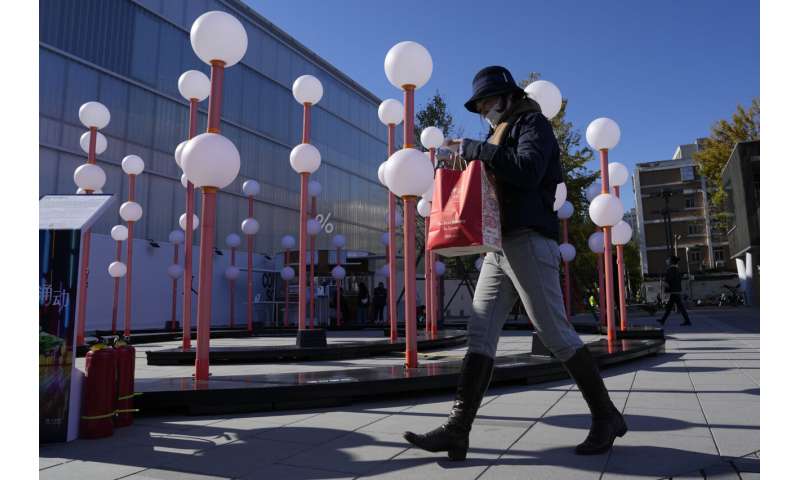
A shopper walks through a mall district in Beijing, Saturday, Nov. 11, 2023. Shoppers in China have been tightening their purse strings, raising questions over how faltering consumer confidence may affect the annual Singles’ Day online retail extravaganza. Credit: AP Photo/Ng Han Guan
-
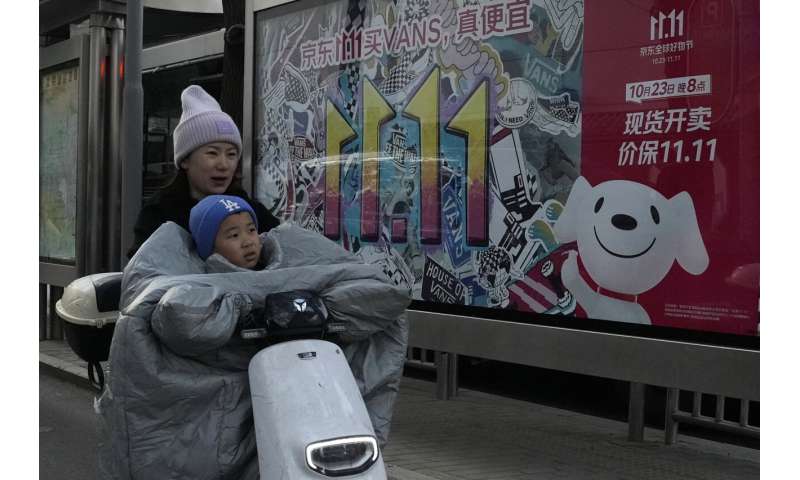
A woman and a child ride past an advertisement for Singles’ Day in Beijing, Wednesday, Nov. 8, 2023. Shoppers in China have been tightening their purse strings, raising questions over how faltering consumer confidence may affect the annual Singles’ Day online retail extravaganza. Credit: AP Photo/Ng Han Guan
-
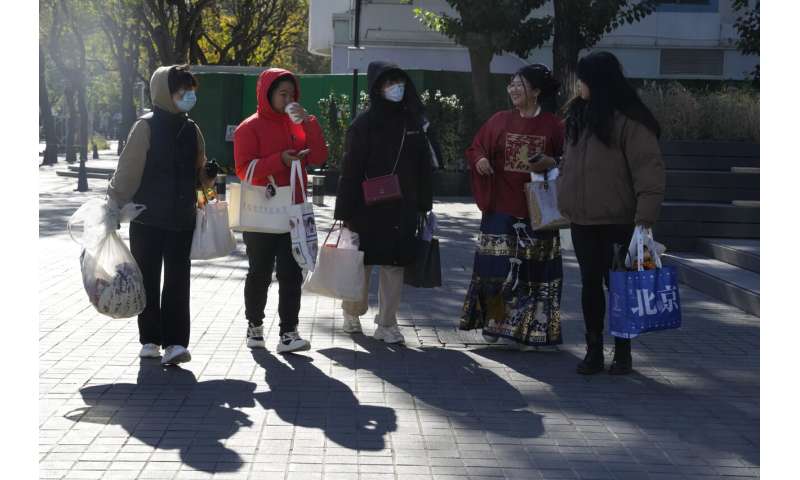
Visitors walk through a mall district in Beijing, Saturday, Nov. 11, 2023. Shoppers in China have been tightening their purse strings, raising questions over how faltering consumer confidence may affect the annual Singles’ Day online retail extravaganza. Credit: AP Photo/Ng Han Guan
-
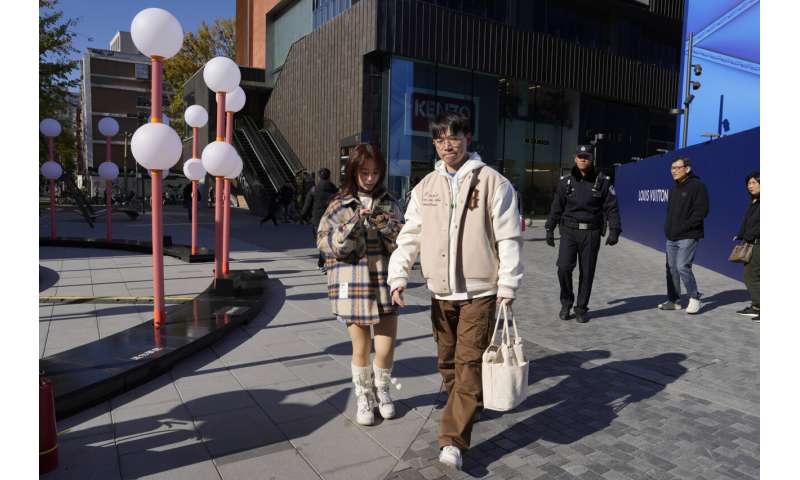
Shoppers walk through a mall district in Beijing, Saturday, Nov. 11, 2023. Shoppers in China have been tightening their purse strings, raising questions over how faltering consumer confidence may affect the annual Singles’ Day online retail extravaganza. Credit: AP Photo/Ng Han Guan
E-commerce platforms are emphasizing low prices for this year’s festival, hoping to attract value-conscious customers looking for good deals. For the 2023 campaign, Alibaba’s Tmall boasts “Lowest prices on the web,” while e-commerce platform JD.com’s tagline for its Singles’ Day campaign is “Truly cheap.” Rival Pinduoduo’s is “Low prices, every day.”
Jacob Cooke, a co-founder and CEO of e-commerce consultancy WPIC Marketing, said that overall spending on durable goods such as home appliances was likely to be weaker because of the crisis in China’s property sector. Feeling less certain of their wealth, shoppers are expected to switch to cheaper brands.
“However, the data shows an enormous appetite among the middle- and upper-class consumers to spend on experiences and on products that enhance their health, lifestyles and self-expression,” Cooke said, pointing to categories such as vitamins, pet care and athletic apparel.
Citation:
Worried Chinese shoppers scrimp, dimming the appeal of a Singles’ Day shopping extravaganza (2023, November 11)
retrieved 11 November 2023
from https://techxplore.com/news/2023-11-chinese-shoppers-scrimp-dimming-appeal.html
This document is subject to copyright. Apart from any fair dealing for the purpose of private study or research, no
part may be reproduced without the written permission. The content is provided for information purposes only.

